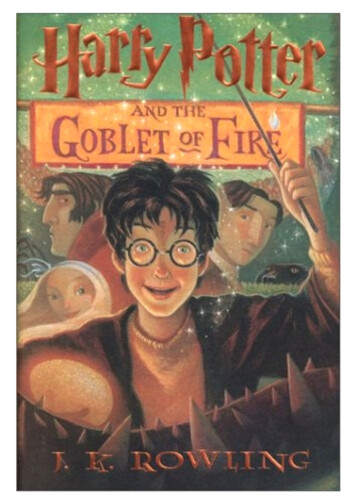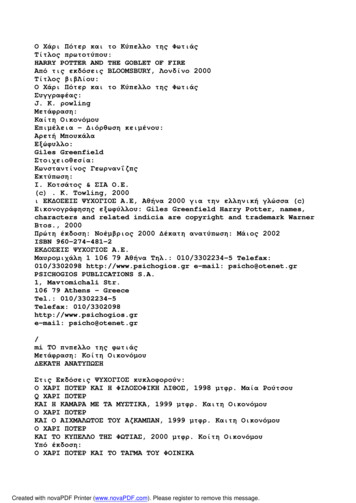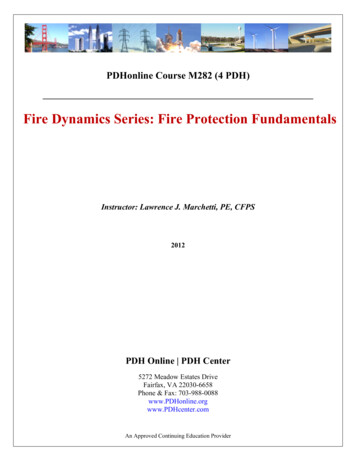
Transcription
Harry Potterand the Goblet of FirebyJ.K. RowlingTHIS E-BOOK WAS NOT PRODUCED FOR PROFIT AND IS NOT FOR SALEwe all know this is a copyright protected book.blah, blah, blah.no reproduction by any means.blah, blah, blah.enjoy.To Peter Rowling.In Memory of Mr. Ridley.And to Susan Sladden.Who Helped HarryOut of His Cupboard.1
CONTENTSONEThe Riddle House - 3TWENTYThe First Task - 219TWOThe Scar - 12TWENTY-ONEThe House-Elf Liberation Front - 236THREEThe Invitation - 18TWENTY-TWOThe Unexpected Task - 250FOURBack to the Burrow - 26TWENTY-THREEThe Yule Ball - 262FIVEWeasleys' Wizard Wheezes - 34TWENTY-FOURRita Skeeter's Scoop - 282SIXThe Portkey - 43TWENTY-FIVEThe Egg and the Eye - 297SEVENBagman and Crouch - 49TWENTY-SIXThe Second Task - 311EIGHTThe Quidditch World Cup - 62TWENTY-SEVENPadfoot Returns - 329NINEThe Dark Mark - 76TWENTY-EIGHTThe Madness of Mr. Crouch - 346TENMayhem at the Ministry - 94TWENTY-NINEThe Dream - 365ELEVENAboard the Hogwarts Express - 102THIRTYThe Pensive - 376TWELVEThe Triwizard Tournament - 111THIRTY-ONEThe Third Task - 392THIRTEENMad-Eye Moody - 125THIRTY-TWOFlesh, Blood, and Bone - 411FOURTEENThe Unforgivable Curses - 136THIRTY-THREEThe Death Eaters - 416FIFTEENBeauxbatons and Durmstrang - 149THIRTY-FOURPriori Incantatem - 426SIXTEENThe Goblet of Fire - 162THIRTY-FIVEVeritaserum - 433SEVENTEENThe Four Champions - 177THIRTY-SIXThe Parting of the Ways - 447EIGHTEENThe Weighing of the Wands -188THIRTY-SEVENThe Beginning - 462NINTEENThe Hungarian Horntail -2042
HARRY POTTER AND THE GOBLET OF FIRECHAPTER ONE - THE RIDDLE HOUSEThe villagers of Little Hangleron still called it "the Riddle House," even though ithad been many years since the Riddle family had lived there. It stood on a hilloverlooking the village, some of its windows boarded, tiles missing from its roof,and ivy spreading unchecked over its face. Once a fine-looking manor, and easilythe largest and grandest building for miles around, the Riddle House was nowdamp, derelict, and unoccupied.The Little Hagletons all agreed that the old house was "creepy." Half a centuryago, something strange and horrible had happened there, something that the olderinhabitants of the village still liked to discuss when topics for gossip were scarce.The story had been picked over so many times, and had been embroidered in somany places, that nobody was quite sure what the truth was anymore. Everyversion of the tale, however, started in the same place: Fifty years before, atdaybreak on a fine summer's morning when the Riddle House had still been wellkept and impressive, a maid had entered the drawing room to find all three Riddlesdead.The maid had run screaming down the hill into the village and roused as manypeople as she could."Lying there with their eyes wide open! Cold as ice! Still in their dinner things!"The police were summoned, and the whole of Little Hangleton had seethed withshocked curiosity and ill-disguised excitement. Nobody wasted their breathpretending to feel very sad about the Riddles, for they had been most unpopular.Elderly Mr. and Mrs. Riddle had been rich, snobbish, and rude, and their grown-upson, Tom, had been, if anything, worse. All the villagers cared about was theidentity of their murderer -- for plainly, three apparently healthy people did not alldrop dead of natural causes on the same night.The Hanged Man, the village pub, did a roaring trade that night; the whole villageseemed to have turned out to discuss the murders. They were rewarded for leavingtheir firesides when the Riddles' cook arrived dramatically in their midst andannounced to the suddenly silent pub that a man called Frank Bryce had just beenarrested."Frank!" cried several people. "Never!"Frank Bryce was the Riddles' gardener. He lived alone in a run-down cottage onthe grounds of the Riddle House. Frank had come back from the war with a verystiff leg and a great dislike of crowds and loud noises, and had been working forthe Riddles ever since.3
There was a rush to buy the cook drinks and hear more details."Always thought he was odd," she told the eagerly listening villagers, after herfourth sherry. "Unfriendly, like. I'm sure if I've offered him a cuppa once, I'veoffered it a hundred times. Never wanted to mix, he didn't.""Ah, now," said a woman at the bar, "he had a hard war, Frank. He likes the quietlife. That's no reason to --""Who else had a key to the back door, then?" barked the cook. "There's been aspare key hanging in the gardener's cottage far back as I can remember! Nobodyforced the door last night! No broken windows! All Frank had to do was creep upto the big house while we was all sleeping."The villagers exchanged dark looks."I always thought that he had a nasty look about him, right enough," grunted aman at the bar."War turned him funny, if you ask me," said the landlord."Told you I wouldn't like to get on the wrong side of Frank, didn't I, Dot?" said anexcited woman in the corner."Horrible temper," said Dot, nodding fervently. "I remember, when he was akid."By the following morning, hardly anyone in Little Hangleton doubted that FrankBryce had killed the Riddles.But over in the neighboring town of Great Hangleton, in the dark and dingy policestation, Frank was stubbornly repeating, again and again, that he was innocent, andthat the only person he had seen near the house on the day of the Riddles' deathshad been a teenage boy, a stranger, dark-haired and pale. Nobody else in thevillage had seen any such boy, and the police were quite sure Frank had inventedhim.Then, just when things were looking very serious for Frank, the report on theRiddles' bodies came back and changed everything.The police had never read an odder report. A team of doctors had examined thebodies and had concluded that none of the Riddles had been poisoned, stabbed,shot, strangles, suffocated, or (as far as they could tell) harmed at all. In fact (thereport continued, in a tone of unmistakable bewilderment), the Riddles allappeared to be in perfet health -- apart from the fact that they were all dead. Thedoctors did note (as though determined to find something wrong with the bodies)that each of the Riddles had a look of terror upon his or her face -- but as thefrustrated police said, whoever heard of three people being frightened to death?As there was no proof that the Riddles had been murdered at all, the police were4
forced to let Frank go. The Riddles were buried in the Little Hangletonchurchyard, and their graves remained objects of curiosity for a while. Toeveryone's surprise, and amid a cloud of suspicion, Frank Bryce returned to hiscottage on the grounds of the Riddle House."'S far as I'm concerned, he killed them, and I don't care what the police say," saidDot in the Hanged Man. "And if he had any decency, he'd leave here, knowing ashow we knows he did it."But Frank did not leave. He stayed to tend the garden for the next family wholived in the Riddle House, and then the next -- for neither family stayed long.Perhaps it was partly because of Frank that the new owners said there was a nastyfeeling about the place, which, in the absence of inhabitants, started to fall intodisrepair.The wealthy man who owned the Riddle House these days neither lived there norput it to any use; they said in the village that he kept it for "tax reasons," thoughnobody was very clear what these might be. The wealthy owner continued to payFrank to do the gardening, however. Frank was nearing his seventy-seventhbirthday now, very deaf, his bad leg stiffer than ever, but could be seen potteringaround the flower beds in fine weather, even though the weeds were starting tocreep up on him, try as he might to suppress them.Weeds were not the only things Frank had to contend with either. Boys from thevillage made a habit of throwing stones through the windows of the Riddle House.They rode their bicycles over the lawns Frank worked so hard to keep smooth.Once or twice, they broke into the old house for a dare. They knew that old Frank'sdevotion to the house and the grounds amounted almost to an obsession, and itamused them to see him limping across the garden, brandishing his stick andyelling croakily at them. Frank, for his part, believed the boys tormented himbecause they, like their parents and grandparents, though him a murderer. So whenFrank awoke one night in August and saw something very odd up at the old house,he merely assumed that the boys had gone one step further in their attempts topunish him.It was Frank's bad leg that woke him; it was paining him worse than ever in his oldage. He got up and limped downstairs into the kitchen with the idea of refilling hishot-water bottle to ease the stiffness in his knee. Standing at the sink, filling thekettle, he looked up at the Riddle House and saw lights glimmering in its upperwindows. Frank knew at once what was going on. The boys had broken into thehouse again, and judging by the flickering quality of the light, they had started afire.Frank had no telephone, in any case, he had deeply mistrusted the police eversince they had taken him in for questioning about the Riddles' deaths. He put downthe kettle at once, hurried back upstairs as fast as his bad leg would allow, and wassoon back in his kitchen, fully dressed and removing a rusty old key from its hookby the door. He picked up his walking stick, which was propped against the wall,5
and set off into the night.The front door of the Riddle House bore no sign of being forced, nor did any ofthe windows. Frank limped around to the back of the house until he reached a dooralmost completely hidden by ivy, took out the old key, put it into the lock, andopened the door noiselessly.He let himself into the cavernous kitchen. Frank had not entered it for many years;nevertheless, although it was very dark, he remembered where the door into thehall was, and he groped his way towards it, his nostrils full of the smell of decay,ears pricked for any sound of footsteps or voices from overhead. He reached thehall, which was a little lighter owing to the large mullioned windows on either sideof the front door, and started to climb the stairs, blessing the dust that lay thickupon the stone, because it muffled the sound of his feet and stick.On the landing, Frank turned right, and saw at once where the intruders were: Atthe every end of the passage a door stood ajar, and a flickering light shone throughthe gap, casting a long sliver of gold across the black floor. Frank edged closer andcloser, he was able to see a narrow slice of the room beyond.The fire, he now saw, had been lit in the grate. This surprised him. Then hestopped moving and listened intently, for a man's voice spoke within the room; itsounded timid and fearful."There is a little more in the bottle, My Lord, if you are still hungry.""Later," said a second voice. This too belonged to a man -- but it was strangelyhigh-pitched, and cold as a sudden blast of icy wind. Something about that voicemade the sparse hairs on the back of Frank's neck stand up. "Move me closer tothe fire, Wormtail."Frank turned his right ear toward the door, the better to hear. There came the clinkof a bottle being put down upon some hard surface, and then the dull scrapingnoise of a heavy chair being dragged across the floor. Frank caught a glimpse of asmall man, his back to the door, pushing the chair into place. He was wearing along black cloak, and there was a bald patch at the back of his head. Then he wentout of sight again."Where is Nagini?" said the cold voice."I -- I don't know, My Lord," said the first voice nervously. "She set out to explorethe house, I think.""You will milk her before we retire, Wormtail," said the second voice. "I will needfeeding in the night. The journey has tired me greatly."Brow furrowed, Frank inclined his good ear still closer to the door, listening veryhard. There was a pause, and then the man called Wormtail spoke again."My Lord, may I ask how long we are going to stay here?"6
"A week," said the cold voice. "Perhapse longer. The place is moderatelycomfortable, and the plan cannot proceed yet. It would be foolish to act before theQuidditch World Cup is over."Frank inserted a gnarled finger into his ear and rotated it. Owing, no doubt, to abuildup of earwax, he had heard the word "Quidditch," which was not a word atall."The -- the Quidditch World Cup, My Lord?" said Wormtail. (Frank dug his fingerstill more vigorously into his ear.) "Forgive me, but -- I do not understand -- whyshould we wait until the World Cup is over?""Because, fool, at this very moment wizards are pouring into the country from allover the world, and every meddler from the Ministry of Magic will be on duty, onthe watch for signs of ususual activity, checking and double-checking identities.They will be obsessed with security, lest the Muggles notice anything. So wewait."Frank stopped trying to clear out his ear. He had distinctly heard the words"Ministry of Magic," "wizards," and "Muggles." Plainly, each of these expressionsmeant something secret, and Frank could think of only two sorts of people whowould speak in code: spies and criminals. Frank tightened his hold on his walkingstick once more, and listened more closely still."Your Lordship is still determined, then?" Wormtail said quietly."Certainly I am determined, Wormtail." There was a note of menace in the coldvoice now.A slight pause followed -- and the Wormtail spoke, the words tumbling from himin a rush, as though he was forcing himself to say this before he lost his nerve."It could be done without Harry Potter, My Lord."Another pause, more protracted, and then -"Without Harry Potter?" breathed the second voice softly. "I see.""My Lord, I do not say this out of concern for the boy!" said Wormtail, his voicerising squeakily. "The boy is nothing to me, nothing at all! It is merely that if wewere to use another witch or wizard -- any wizard -- the thing could be done somuch more quickly! If you allow
HARRY POTTER AND THE GOBLET OF FIRE CHAPTER ONE - THE RIDDLE HOUSE The villagers of Little Hangleron still called it "the Riddle House," even though it had been many years since the Riddle family had lived there. It stood on a hill overlooking the village, some of its windows boarded, tiles missing from its roof, and ivy spreading unchecked over its face. Once a fine-looking manor, and











